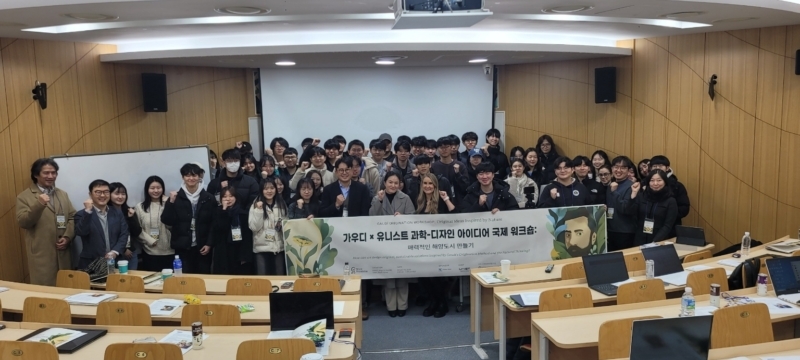The School of Liberal Arts (SLA) at UNIST convened the ‘Global Origination Workshop on Science and Design Integration to Make Coastal Cities More Attractive‘ in collaboration with the Gaudí World Foundation (GWF) on January 15, 2025. The workshop attracted a diverse group of experts and students, focusing on the nature-inspired design approach championed by Antoni Gaudí.
Key objectives of the workshop included igniting creative thinking, inspiring sustainable solutions by integrating principles of nature, design, and humanism, and exploring the relevance of Gaudí’s origination methodology in addressing modern challenges in science and design. Through expert lectures, hands-on activities, and networking opportunities, participants delved into Gaudí’s origination methodology and examined its connection to biomimicry, biophilia, and cutting-edge technology.
The event commenced with a welcoming address by Professor Hyomin Kim from the School of Liberal Arts at UNIST. Keynote speeches were delivered by GWF Creative Director Sofya Abramchuk and Professor Sungwook Hong from Seoul National University. Director Abramchuk presented on ‘Idea Generation Using Gaudí Methodology,’ while Professor Hong explored the ‘Convergence of Science, Technology, and Art.’ Both emphasized the significance of creative thinking and interdisciplinary collaboration.
Participants were encouraged to devise solutions to modern city challenges, drawing inspiration from Gaudí’s principles of Origin, Humanism, and Sustainability. They examined the masterpiece Colonia Güell to experience a case study in the fusion of natural and human-centered design. This allowed participants to visualize how Gaudí’s design principles could be applied to real-world challenges.
The workshop fostered collaboration among the fields of architecture, design, and science and technology, allowing participants to explore innovative ideas for marine city development while enhancing their problem-solving abilities through nature-friendly design. This collaboration culminated in the presentation of a practical plan for sustainable urban development.
Following the workshop, UNIST and the GWF signed a business agreement to advance creative convergence in education and research. This agreement focuses on joint research and development initiatives and strengthens networking opportunities with industries and local communities, marking a significant step towards developing design solutions that integrate science, technology, and art while promoting global educational cooperation.
President Chong Rae Park stated, “By converging science and art, we will create an innovative educational model and unique research outcomes for ‘Pioneer UNIST.’ This agreement is meaningful not only for advancing cutting-edge science and technology but also for fostering a transformative innovative culture within universities.”
The workshop was organized by the UNIST Convergence Science Research Center (CISAR), the WISET Southeast Ulsan Regional Project Group, and SERA (Sustainable Environment Renewable Architecture), and was sponsored by Tetra Tech, a global leader in environmental and engineering services.












